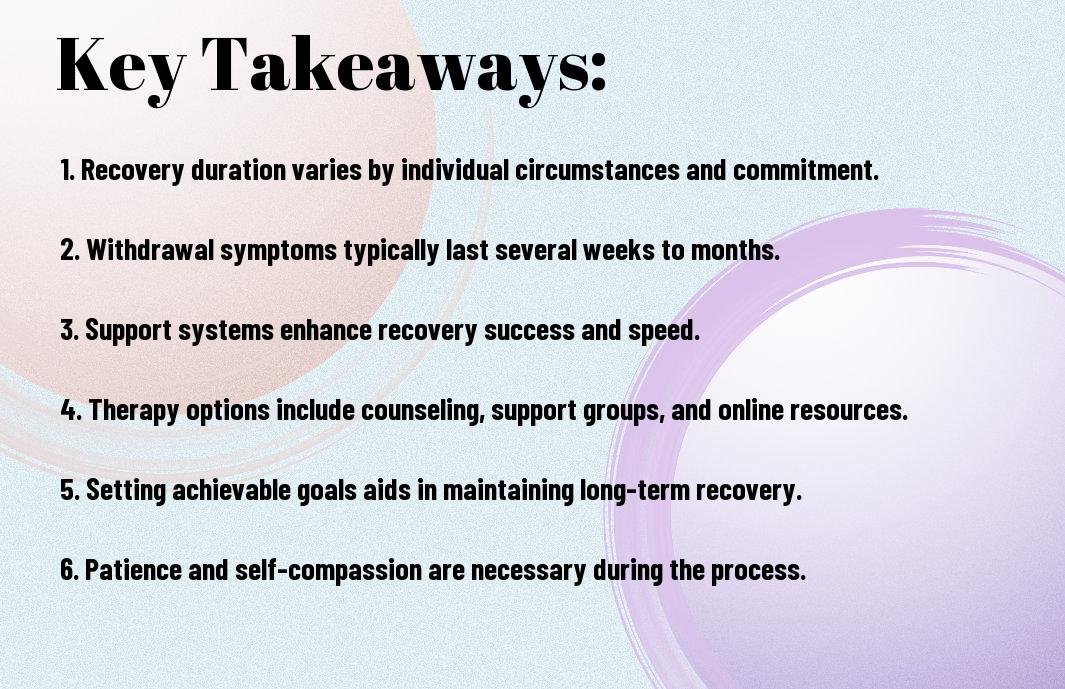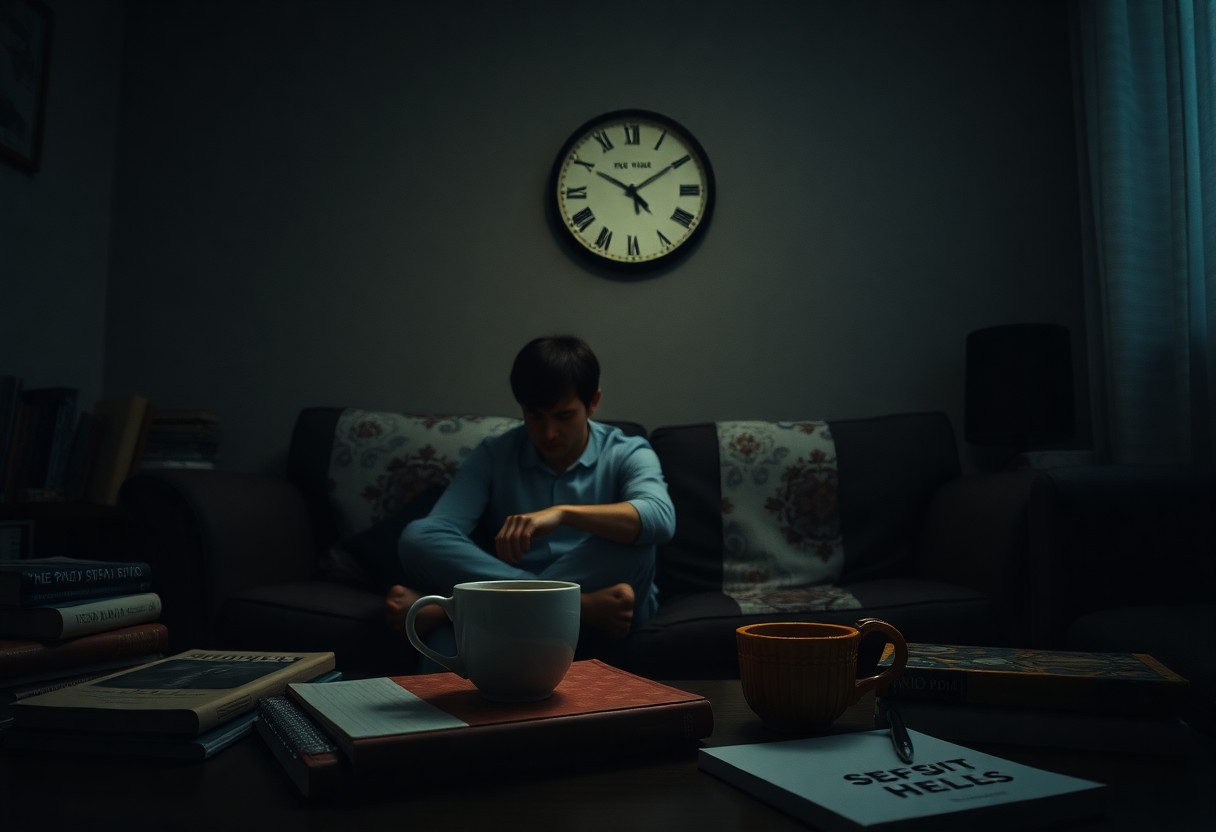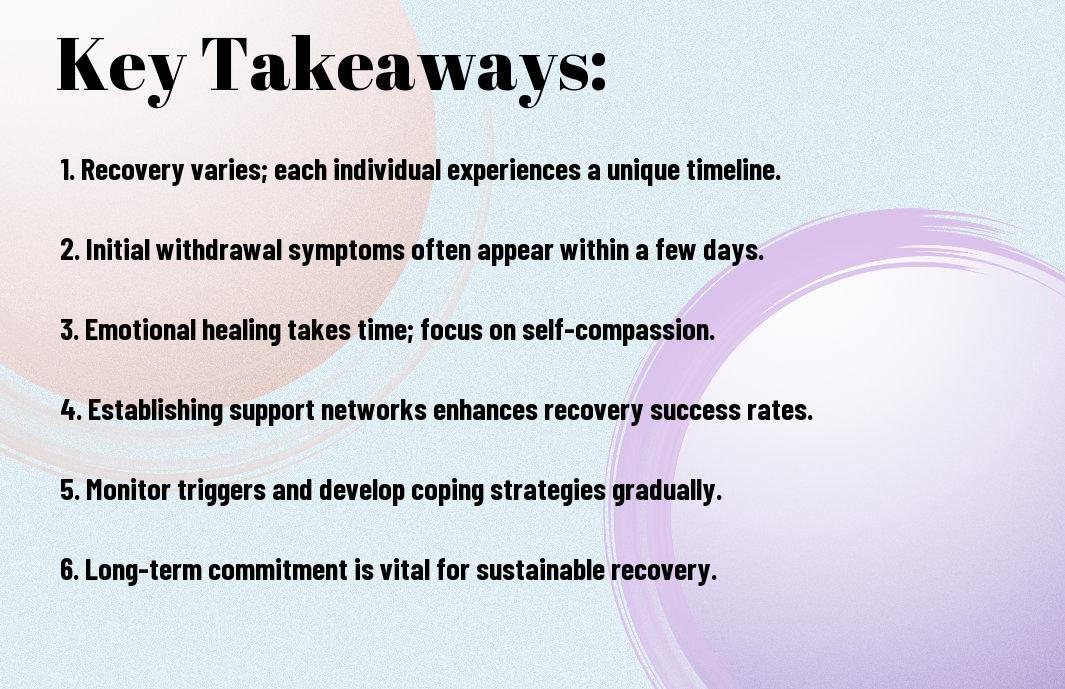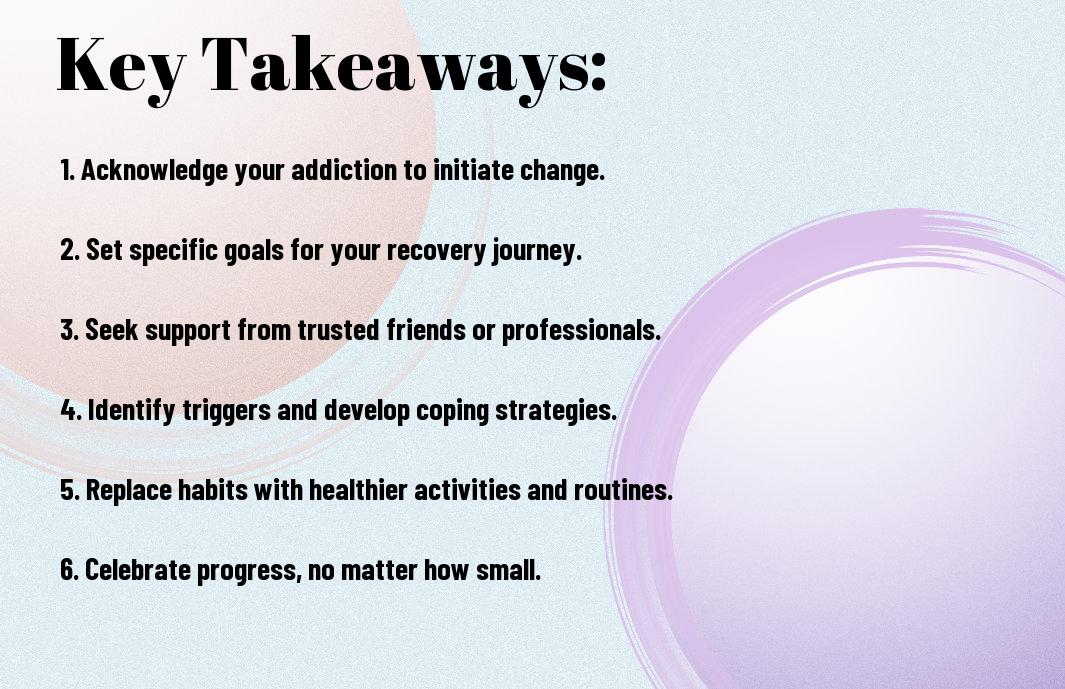You may have found yourself wondering about the timeline for recovery from porn addiction, and understanding this journey is important for your healing process. While the duration varies from person to person, it is generally influenced by factors such as the intensity of your addiction, commitment to recovery, and the support systems you have in place. This guide will provide you with key insights and practical strategies to help you navigate your path to recovery effectively.

Key Takeaways:
- Recovery duration varies individually, shaped by factors such as frequency of use and psychological impacts.
- Initial withdrawal symptoms can appear within days, while full recovery may take several months to years.
- Professional guidance through therapy or support groups can significantly enhance the recovery process.
- Developing healthy coping mechanisms and habits is vital for long-term success in overcoming addiction.
- Maintaining a support network of friends and family can provide motivation and accountability during recovery.
- Awareness of triggers and avoiding high-risk situations are key strategies in managing urges and preventing relapse.
- Engaging in alternative activities and hobbies can help redirect focus away from porn and foster personal growth.

Understanding Porn Addiction
To grasp the complexities of porn addiction, it’s vital to recognize that it significantly impacts your mental and emotional wellbeing. This addiction often develops when viewing adult content becomes compulsive, leading to interference with daily life, personal relationships, and overall satisfaction. Understanding this condition can help you identify the signs and take steps toward recovery.
Definition and Symptoms
Alongside any addiction, porn addiction manifests through several symptoms that may include a preoccupation with pornography, neglecting responsibilities, and experiencing distress when unable to view it. You might find that your personal relationships suffer due to the time and emotional energy invested in adult content, indicating a need for reflection and support.
Causes and Triggers
After recognizing the symptoms, it’s important to explore the underlying causes and triggers of your porn addiction. Various factors, such as emotional distress, relationship issues, or societal influences, can push you toward seeking comfort in pornography. Understanding these elements can empower you to combat the addiction more effectively.
For instance, many individuals turn to pornography as a coping mechanism for stress or emotional pain. Life events such as breakups, work pressure, or even boredom can trigger an urge to seek solace in adult content. Additionally, early exposure to pornography can shape your expectations and desires, leading to repeated patterns of behavior that form the foundation of an addiction. By identifying what prompts your consumption, you can begin to address these triggers and develop healthier coping mechanisms.
The Recovery Process
Some individuals may find the recovery process from porn addiction to be transformative, while others may face various obstacles along the way. Understanding the recovery process is vital to your journey, as it involves a series of stages that guide you toward healthier habits and a more fulfilling life. Throughout this time, you will need support, self-reflection, and commitment to overcome challenges and build a new relationship with intimacy and sexuality.
Stages of Recovery
At the outset of your recovery, it’s important to identify where you are in your journey. The stages typically include awareness, acceptance, commitment, and maintenance. Each stage requires self-exploration and perseverance, and understanding these steps can help you navigate your path effectively. Acknowledging your progress will empower you to keep moving forward and make healthier choices in your daily life.
Timeframe for Recovery
Beside the various stages of recovery, you may wonder how long the entire process can take. Each person’s experience is unique, influenced by factors such as the severity of addiction, the strategies employed in recovery, and your own commitment to change. You may notice improvements in your mental and emotional health within weeks, but full recovery and the development of new habits could take months or even years.
In fact, it’s vital to be patient with yourself as you progress through your recovery. Healing from porn addiction is not a linear journey; setbacks are common and can occur at any time. You might find that your emotional responses, relationship dynamics, and sexual health improve gradually. By focusing on a consistent process and being kind to yourself during this time, you set the foundation for lasting change that extends beyond mere abstinence.
Factors Influencing Recovery Duration
All individuals experience unique journeys in overcoming porn addiction, influenced by several key factors. These include:
- Your personal commitment
- The severity and duration of your addiction
- Underlying mental health issues
- The availability of support systems
- Your coping mechanisms
Perceiving these factors can provide insight into your recovery timeline.
Personal Commitment
Recovery from porn addiction requires unwavering personal commitment. The effort you invest in changing your habits, seeking out resources, and staying resilient in the face of challenges defines the pace of your recovery journey. Your readiness to confront triggers and actively participate in the healing process is paramount to achieving lasting change.
Support Systems
An imperative aspect of your recovery is the support systems you establish. Surrounding yourself with empathetic friends, family members, or support groups can significantly enhance your journey toward healing.
Further, engaging in supportive environments allows you to share experiences, gather insights, and receive encouragement during difficult moments. Connecting with professionals such as counselors or therapists can also provide guidance tailored to your specific needs, fostering a more profound sense of accountability and hope as you work through challenges and obstacles.

Strategies for Effective Recovery
Keep in mind that recovery from porn addiction is a multifaceted journey that requires dedication and personalized strategies. By combining various approaches such as therapy, support groups, and self-help techniques, you can create a comprehensive plan tailored to your needs that will facilitate lasting change. Establishing a strong support structure and practicing healthy coping mechanisms are necessary steps in regaining control over your habits.
Therapy Options
Strategies for overcoming porn addiction may involve professional therapy options, such as cognitive-behavioral therapy (CBT) or group counseling. These therapies help you understand the underlying causes of your addiction and develop healthier thought patterns and behaviors. Working with a qualified therapist can offer you valuable insights and serve as an necessary support system throughout your recovery process.
Self-Help Techniques
Behind every successful recovery are effective self-help techniques that you can implement in your daily life. These may include mindfulness practices, journaling, establishing boundaries with technology, and setting personal goals. By taking proactive steps in your mental and emotional wellness, you enhance your ability to resist temptation and regain control over your actions.
And as you explore these self-help techniques, consider integrating mindfulness meditation and regular physical activity into your routine. They not only improve your mental health but also increase your resilience against urges. Setting small, achievable goals can help maintain motivation and track progress. Engaging in open conversations with trusted friends or family members about your challenges can also provide fresh perspectives and reinforce your commitment to recovery.
Managing Relapses
Once again, it’s important to approach relapses with understanding rather than guilt. Having a plan in place can help you navigate these moments effectively. Seeking support and learning from setbacks allows you to grow. For insightful strategies on this journey, check out How Long To Rewire Your Brain From Addiction, which provides helpful information on recovery timeframes and brain recovery.
Identifying Warning Signs
By paying attention to your thoughts and feelings, you can identify early warning signs that a relapse may be on the horizon. Recognizing these triggers, whether they stem from stress, boredom, or specific environments, enables you to take proactive steps to avoid falling back into old habits.
Developing Coping Mechanisms
Along your journey, establishing effective coping mechanisms is crucial to manage urges and maintain your progress. These techniques might include mindfulness practices, engaging in hobbies, or reaching out to supportive friends or communities.
And developing strong coping mechanisms is not just about reacting to cravings; it’s about building a lifestyle that aligns with your personal goals. Experimenting with various strategies, such as journaling your thoughts or participating in exercise, can enhance your resilience. This proactive approach empowers you to address challenges head-on, making you more equipped to handle stress without reverting to old patterns.

Long-Term Outlook
For individuals recovering from porn addiction, the long-term outlook can be positive with sustained effort and support. Understanding that recovery is a journey can help set realistic expectations. As you navigate this path, consider reaching out to the National Helpline for Mental Health, Drug, Alcohol Issues for guidance and encouragement. Building resilience and developing healthy coping mechanisms will contribute significantly to your ongoing recovery.
Maintaining Recovery
By taking proactive steps, you can effectively maintain your recovery from porn addiction. This involves regularly engaging with supportive communities, setting personal goals, and practicing self-care techniques. Establishing a routine that prioritizes your mental health will assist you in navigating challenges that may arise.
Building Healthy Relationships
About nurturing healthy relationships is vital in the recovery process. Connecting with supportive friends, family, or peers who understand your journey can offer accountability and encouragement as you work toward healing.
With this, you should focus on open communication and trust in your relationships. Take the time to express your feelings and needs while also listening to others. Engaging in activities with supportive individuals can help you establish a sense of connection that reinforces your commitment to recovery and encourages a fulfilling, balanced life.
Conclusion
Upon reflecting, it’s vital to understand that recovering from porn addiction is a personal journey that varies for each individual. You may encounter different challenges and milestones along the way, but with commitment and the right strategies, you can achieve lasting change. Engaging in supportive communities, seeking professional help, and adopting healthier habits will not only facilitate your recovery but also empower you to reclaim control over your life. Stay patient and focused on your goals, as every step you take brings you closer to a healthier future.
FAQ
Q: What factors influence the recovery time from porn addiction?
A: Recovery time can be influenced by various factors, including the individual’s mental health, the duration and severity of the addiction, support systems in place, and the methods used for recovery. Those with strong support networks and effective coping strategies may progress more quickly than those who do not.
Q: Is there a typical timeline for recovery from porn addiction?
A: While timelines can vary significantly, some individuals may begin to notice improvements within a few weeks of reducing or eliminating porn use. More comprehensive recovery often takes several months to years, particularly if deep-seated issues or habits are being addressed concurrently.
Q: Are there specific steps I can take to speed up my recovery process?
A: To expedite recovery, individuals can participate in therapy or counseling, join support groups, practice mindfulness and stress-reduction techniques, and identify and modify triggers for porn use. Setting achievable goals and tracking progress can also help maintain motivation.
Q: How do withdrawal symptoms affect recovery time?
A: Withdrawal symptoms can present physical and emotional challenges that may impact recovery duration. Common symptoms include anxiety, irritability, and cravings. Managing these symptoms through professional help or support groups can facilitate a smoother transition and potentially speed up the recovery process.
Q: Is professional help always necessary for recovery from porn addiction?
A: While professional help can provide significant advantages for many individuals, it is not always required. Some may find success through self-help strategies or peer support. However, those with more severe addictions or underlying mental health issues will likely benefit from guidance by a qualified therapist.
Q: Can lifestyle changes influence the recovery timeline?
A: Yes, making lifestyle changes can greatly influence recovery. Engaging in regular physical activity, maintaining a balanced diet, and cultivating healthy relationships can support overall well-being and enhance resilience against triggers, ultimately shortening the recovery process.
Q: How do I know if I am making progress in my recovery?
A: Progress can manifest in multiple ways, including reduced cravings, improved emotional regulation, healthier relationships, and an ability to cope with stress without reverting to addiction behaviors. Keeping a journal to track feelings and experiences can help identify positive changes over time.










